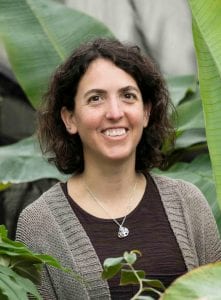-Magdalen Lindeberg
Recently hired faculty in the School of Integrative Plant Science will be offering several courses in the coming academic year. Some of these, like Gaurav Moghe’s “Concepts and Techniques in Computational Biology” and Carlyn Buckler’s “Digital Technologies in Science Communication” are newly developed. Other courses have existed previously, but will now reflect the perspectives and expertise of new instructors. Take a look – some of these may be a good fit for you or someone you know!
PLBRG 7170 – Quantitative Genetics in Plant Breeding – Kelly Robbins

This course will provide students with a solid foundation in quantitative genetics theory, as applied to the field of plant breeding, and introduce students to modern day applications in genomic selection and genome-wide association mapping. While the methodologies of plant and animal breeding are distinct in many ways, the core principles are the same and this course will attempt to cover topics in a way that is inclusive of animal breeding applications. Although this course will cover a wide range of topics it is by no means an exhaustive coverage quantitative genetics, and students are strongly encouraged to compliment the principles learned in the class with introductory courses in statistical methods and experimental design. This is a 3 credit course offered in fall semester of alternate years.

PLSCS 4200 – Geographic Information Systems (GIS): Concepts and Application – Ying Sun
This course applies GIS data management and geospatial techniques to agronomic and natural environmental systems. The course is intended for undergraduate and graduate students interested in advancing their GIS knowledge with additional techniques and hands-on experiences in using GIS concepts/data/tools to address research questions in their interested fields of study. This three credit course is taught in the spring and will be the second time it has been offered by Sun.
PLBIO 4000 / 6000 – Concepts and Techniques in Computational Biology – Gaurav Moghe

This course is geared towards graduate students and advanced biology undergraduates seeking a better understanding of computational biology. Lectures will be a combination of presentations, paper discussions and hands-on sessions. Labs and paper discussions will have a significant component of plant science, but students from non-plant fields are also encouraged to register. Students will learn to work in a Unix environment, code using Python/R, and deploy tools for genome assembly, RNA-seq data analysis, local and global sequence alignment, protein domain searching using Hidden Markov Models, phylogenetic reconstruction, metabolomic analysis, and machine learning. Lectures will cover the algorithmic concepts underlying popular tools. The students will also learn practical aspects of implementing these tools in their own research using facilities available at Cornell. This is a new, four credit course, to be taught in spring of 2019.
BIOEE 1780 – An Introduction to Evolutionary Biology and Diversity – Chelsea Specht

This course considers explanations for pattern of diversity and the apparent good fit of organisms to the environment. Topics include the diversity of life, the genetics and developmental basis of evolutionary change, processes at the population level, evolution by natural selection, modes of speciation, long-term trends in evolution, origin of humans.
Students taking the 5-credit option read additional materials from primary literature and write essays in place of regular exams. The 5-credit option is limited to 15 students per section each semester with selection based on applications submitted the first day of class. Students enrolled in the 5-credit option will travel to the Galapagos Islands over Spring Break. This 4-5 credit course is offered fall and spring, with the spring class to be taught by Specht
PLSCI 4940 – Digital Technologies in Science Communication – Carlyn Buckler

Digital Technology and Science Communication will cover the most current digital technologies (DT) for use in science communication and research, as well as a look forward to new technologies being developed for science education, collections management, and other aspects of science research and outreach. Basic skills/resources will be covered to understand, design and develop products using augmented and virtual reality, 3D design and printing, online resources, and more. This course is “hands-on” and includes several small projects as well as a capstone final project. Students do not need prior experience with any of these technologies to be successful in the course.
We will discuss how to understand the return on investment of various technologies, using DT to increase the diversity in science, increasing accessibility for those with disabilities, and to engage those with different learning styles to understand science in novel ways. Students will have access to lab space and resources for prototyping, testing, and development of digital resources. Buckler will also be teaching a class on Science and Society in Spring 2018.
A complete list of course offerings in the Plant Sciences and five SIPS sections can be viewed at the Cornell Registrar Site
